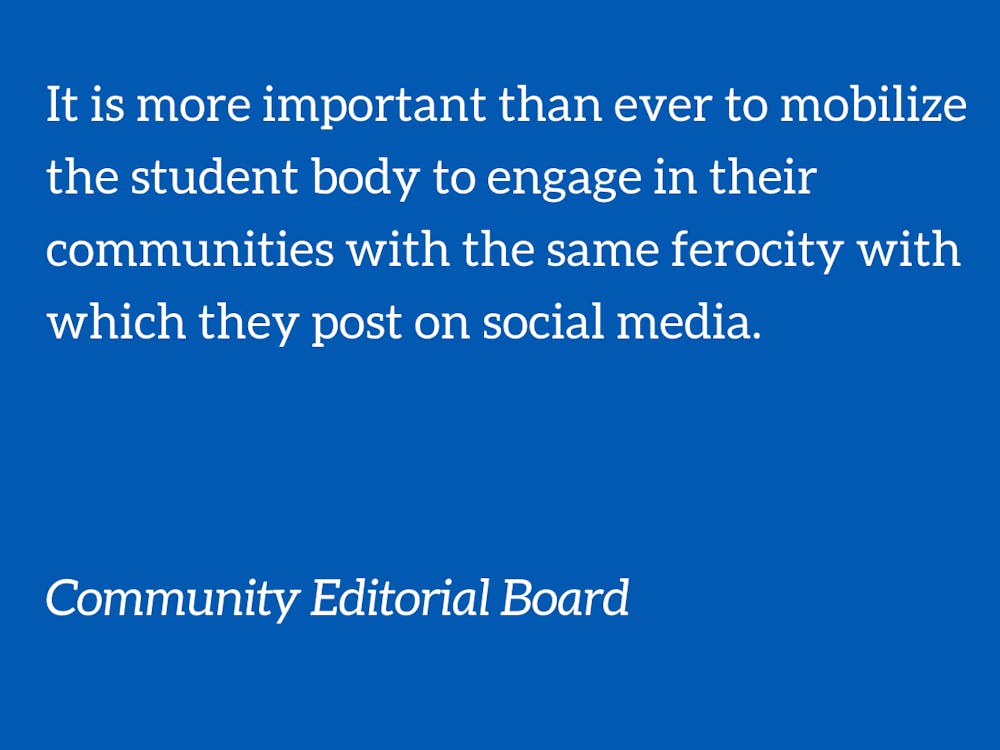The chaos of the Trump administration may be over, taking with it the 24/7 news coverage and tweet storms. No longer are our phones graced with news alerts of insurrections or impeachments, warmongering or womanizing. But did political activism on Duke’s campus likewise fall by the wayside?
Recent weeks have produced bombshells across North Carolina’s political landscape. Newly passed congressional and state legislative maps, drawn by Republicans in the state legislature, were overturned by the majority Democratic North Carolina Supreme Court because of their undue partisan bias. Furthermore, Congressman Madison Cawthorn (R-11) was recently sued by constituents seeking to prevent his reelection campaign. These constituents argue that Cawthorn engaged in insurrection against the United States through his actions on January 6, thus making him ineligible to hold federal office under the 14th Amendment. While each significant in their own right, these events shook the political foundations of the state and the nation. Why, then, has there been such limited mention of them on Duke’s campus?
Duke students have historically been active in the political domain, fighting against racism and police brutality. We must look no further than The Chronicle’s own opinion pages, which rebuff Duke’s treatment of writing professors, decry pretentious chants in sporting events and wade into conflict on some of the most pressing and controversial issues of the day. These forays are clearly political, as proponents seek systemic change in organizations which exercise authority. Yet, the student-driven energy fueling these fights is strikingly absent on state and local issues.
When the state legislature passes blatantly gerrymandered political maps that skew elections in favor of one party, they attack the very foundations of American democracy. No longer do voters choose their representatives: now representatives choose their voters. Furthermore, gerrymandering has historically been used to disenfranchise minority voters, and this time is no different. Maps drawn in Texas, Alabama, Louisiana, and yes, North Carolina, blatantly “pack” minority voters together in some locations and “crack” them in others, producing fewer districts where minority voters can exercise serious electoral power.
Gerrymandering is morally reprehensible to those who claim to support democracy; it violates the core foundations essential to a representative system of government. North Carolina perennially swings between parties and has previously decided control of Congress and the White House. Why, then, is there a lack of student activism in combating gerrymandering or working to get out the vote in non-presidential election years? Why are Duke students not engaging in local government? Why aren’t they fighting for Durham and North Carolina?
This political “Duke Bubble,” whereby students neglect regional politics, is strikingly ironic considering the presence of an internationally renowned public policy school on campus. If any demographic is familiar with the importance of the 10th Amendment and local government, this group of public policy majors is certainly a prime contender. Rather than pursuing the abundant opportunities to work in city and municipal governments, Duke students flock to the international centers of Washington D.C. and New York City in an attempt to secure prestigious internships in the halls of national government.
As one of the university's largest majors, Public Policy represented 233 graduating students in 2020—this disparity in local vs. national participation is hardly an isolated problem. Contrary to producing local leaders with personal relationships to their communities, the current apathy surrounding local government serves to propagate damaging (and unfortunately, at times true) stereotypes. By neglecting our local community, we lend merit to critics who paint Duke students as privileged to the point of abandoning community-specific work.
The results of this brain-drain, as Duke students congregate in metropolises like D.C. and New York City, are evident across the nation. Local school boards and state governments are increasingly susceptible to vastly disproportionate representation. Some voters, who might have otherwise elected a public official with their interests in mind, instead skipping voting altogether. As the 2022 midterms approach, it is more important than ever to mobilize the student body to engage in their communities with the same ferocity with which they post on social media.
Duke students must no longer treat North Carolina politics as a mere means to an end—an academic vessel to arrive at their national ambitions. Engaging in local and state issues can create meaningful change, impacting real lives. Duke students have an obligation to engage in the Durham and North Carolina communities, lending their skill sets and efforts both while at Duke and also following graduation.
Authors' note: A panel of three North Carolina judges recently implemented their own Congressional map plan, which will likely produce an 8 Republican to 6 Democratic Congressional delegation. The legal future of this map is uncertain, as appeals are possible to the North Carolina and/or United States Supreme Court.
The Community Editorial Board is independent from the editorial staff of the Chronicle. Their column runs on Tuesdays.
Get The Chronicle straight to your inbox
Sign up for our weekly newsletter. Cancel at any time.

